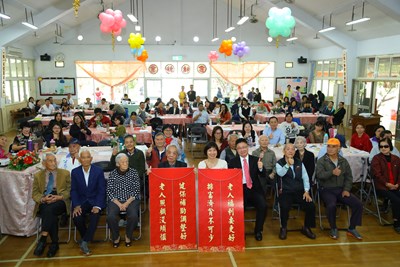
According to Taichung City’s health insurance subsidies to the elderly policy, any citizen over 65 years old with an individual income tax rate under 5% is eligible for subsidies. Nearly two-thirds of seniors (180,000 out of 290,000 seniors) received subsidies. According to the Social Affairs Bureau, nearly half of the subsidy receivers have real estate worth more than NTD 7.5 million and annual interest income over NTD 50,000. However, the health insurance premiums are calculated based on individual income. If the government provides extra subsidies, it will be repetitious. Especially, the subsidies in 2015 were over NTD 1 billion and it grew to NTD 1.2 billion in 2016. Adjustments must be made especially with limited resources. Thus, the subsidies will only be given to 12,000 mid-to-low income seniors who are in desperate need of help. By doing so, the National Health Insurance will return to the definition of social insurance.
Today (4th), after Deputy mayor Lin Yi-ying and Director-General Lu Chian-Te of the Social Affairs Bureau went to the Ren'ai Senior Citizens' Home to announce the rich-excluded health insurance subsidies to the elderly program, the City Government launched another 7 services. The budget saved this year will be turned into actual benefits instead of cash distribution based on the principle of “social investment”. The expanded services will align with the central government’s plan including the launch of long-term care 2.0, doubling classes for the Senior citizen adult education program, meal sharing, meal delivery covering a wider area, doubling long-term care manpower plan, cards for seniors and persons with disabilities, artificial teeth subsidies, etc. The budget totaled for senior benefits in 2017 will be NTD 120 million more than that in 2016, overall at NTD 3.66832 billion.
According to Deputy mayor Lin, she had been working in the HONDAO Senior Citizen’s Welfare Foundation for 20 years. It’s common to see children fail to find the appropriate caregivers even if they are willing to pay for the service. The City Government issued the “senior care one-stop service” policy, integrating services for healthy, sub-healthy and disabled seniors. Healthy seniors can join the Senior citizen adult education program; slightly sick seniors can have meal delivery and home care services. Those services will be great news for family members. Starting form this year, the budget saved from the rich-excluded health insurance subsidies to the elderly program will be used to expand services, which is a wise decision and will bring Taichung City’s senior care to a new level.
Director-General Lu Chian-Te of the Social Affairs Bureau said that more budget would be allocated to senior services in 2017; an extra 100 million NTD will be used on “Doubling classes of Senior citizen adult education program”, adding classes of the undersupplied senior citizen adult education program from this year’s 470 to 1,000.
On the other hand, the Social Affairs Bureau will invest NTD 100 million to launch the “Doubling community meal sharing plan”, encouraging organizations in communities to share meals among citizens. 300 meal sharing locations are expected to be completed citywide. With only NTD 20, seniors can enjoy rich and delicious meals. For underprivileged seniors, the Bureau will invest another NTD 100 million to build four 5-star central kitchen facilities in downtown Shanhaitun and connect with a hunger free online platform, providing close access to meals for underprivileged seniors.
For disabled seniors, the City Government will invest NTD 900 million in line with the Central policy of the long-term care 2.0 plan and extend the service to preventive care, delayed disability, dementia and further to home medical care and hospice care. Home care staff is the key to expanding the services. The Social Affairs Bureau planned to invest NTD 100 million to provide seniority and professional allowance to improve the compensation of the staff. The Bureau even planned to let the City Government train the home care staff, hoping to double the existing 720 home care staff in Taichung City.
Besides, to promote the social participation of seniors, the City Government will continue to invest NTD 230 million to subsidize senior fare discount program “Cards for seniors and persons with disabilities”. The program covers the widest area for seniors, applicable for all national highways nationwide, encouraging seniors to go out more often. Artificial teeth subsidy program for seniors also proves effective. Therefore, NTD 300 million will be injected to extend the program, expecting to cover 7500 people.
According to the Social Affairs Bureau, the rich-excluded health insurance subsidy program not only can take care of the underprivileged groups but only better utilize the resources. By leveraging the idea of social investment, the medical treatment subsidy program for seniors will be transformed into social welfare programs to promote seniors’ health so seniors at home can see and enjoy the benefits. Overall, senior benefits increase instead of decrease. Any questions, please call 04-22289111#37975.

 Facebook
Facebook
 Twitter
Twitter
 LINE
LINE